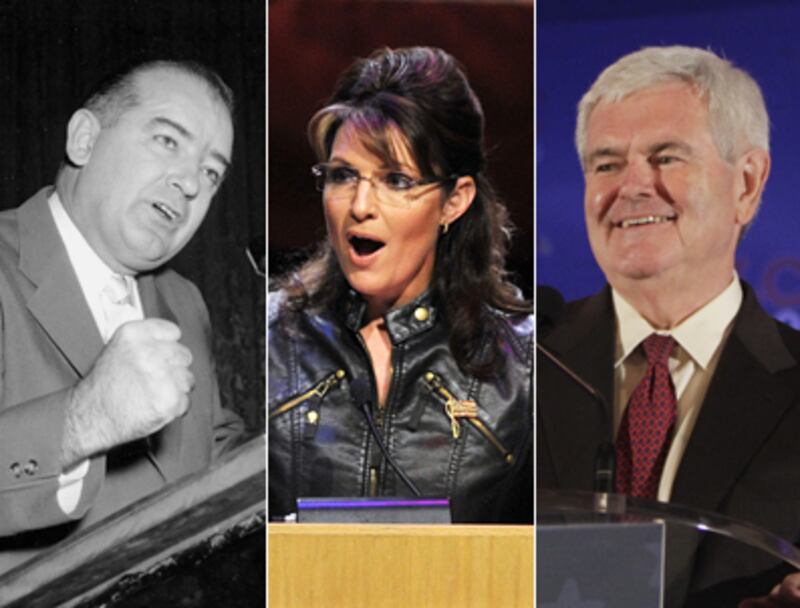With each new attack on a mosque, each new anti-Muslim slur by a prominent politician or pundit, each new poll showing that large swaths of Americans think President Obama is lying about his faith, it becomes clearer that we are in the midst of a national psychosis: the worst spasm of paranoia and bigotry of the post-Cold War age. The interesting question is: Why now?
The answer lies in the intersection of isolationism and war. At first glance, it seems odd that America is witnessing this eruption of anti-Muslim hate now rather than immediately after the 9/11 attacks. But historically, it’s not odd at all. Consider the “red scares” of the early and mid-20th century. In April 1917, the United States entered World War I. That fall, the Bolsheviks seized power in Russia. But it wasn’t until more than a year later, in November 1919, that Woodrow Wilson’s attorney general, A. Mitchell Palmer, began arresting and deporting thousands of communists, anarchists, immigrants, and labor radicals.

The hysteria that fueled the Palmer Raids resulted partly from World War I itself, which produced a wave of ultra-nationalism, initially targeting Americans of German descent. But by late 1919, Americans had soured on the war. Palmer’s raids began, in fact, the very month that the Senate rejected the Treaty of Versailles, thus spurning Wilson’s effort to permanently entangle the United States in European affairs. Less than 18 months after that, Congress passed the Emergency Quota Act of 1921, which virtually cut off immigration from Eastern and Southern Europe. The paranoid anti-communism of the Palmer Raids, in other words, represented an inversion of the jingoism spawned by war. Frustrated in their efforts to remake Europe, Americans turned their fury inward, redirecting it toward the “enemy within,” which could be defeated at lower cost in money and blood.
The awful irony is that persecuting Muslims at home actually endangers American security, just as the red scares of the mid-20th century aided the USSR.
America’s second red scare, which began in the late 1940s, featured a similar dynamic. Many of the politicians who screamed loudest about communist subversion in the early years of the Cold War had been isolationists before World War II. And many remained isolationists of a sort. Joseph McCarthy and other Midwestern Republicans were generally skeptical of the NATO alliance, which, like the Treaty of Versailles, required the United States to permanently commit its money and men to Europe’s defense. In contrast to Harry Truman, who especially after 1950 began dramatically building up America’s army and extending America’s commitments overseas, Republicans like McCarthy and Robert Taft offered a cheaper, simpler strategy for the nascent Cold War. First, they proposed building up the Air Force, and telling the USSR that the U.S. would retaliate against communist aggression by dropping nuclear bombs. Second, they insisted that the communist threat was largely domestic, and could be eradicated at minimal expense by exposing the hundreds of Soviet agents nestled in the State Department. As McCarthy said in the famous February 1950 speech where he waved a piece of paper ostensibly containing the names of communist spies, “the reason we find ourselves in a position of impotency is not because the enemy has sent men to invade our shores but rather because of the traitorous actions” of people at home. It was a convenient lie, which allowed a war-weary nation to imagine that the U.S. could have prevented Eastern Europe and China from falling to communism without spilling a drop of American blood.
• John Avlon: The Tea Party’s Northern Insurgency• Benjamin Sarlin: The Tea Party’s Coporate Ally • Will Bunch & Douglas E. Schoen Debate the Tea Party’s InfluenceAll of which brings us to today. For many years now, the Pew Research Center has been asking Americans whether the U.S. should “mind its own business internationally and let other countries get along the best they can on their own.” In 2002, Americans rejected this baldly isolationist statement by well over two to one. Last December, when Pew asked again, it found that Americans agreed with it by a margin of five points. In both 2002 and 2009, Democrats proved slightly more isolationist than Republicans, probably because of their greater antipathy to America’s wars abroad. But among Democrats, isolationist sentiment has proven more stable. Where it has jumped dramatically has been among Republicans, who were 22 points more likely to endorse Pew’s statement last year than in 2002.
Partly, this rising Republican isolationism is the result of no longer trusting America’s commander in chief. As an internationalist-minded, religiously inclusive conservative, George W. Bush kept GOP isolationism in check, just as he curtailed GOP Islamophobia (and, for that matter, GOP hostility to Hispanic immigrants). But there’s something deeper at play than just a switch of presidents. Ever since 9/11, according to opinion polls, Republicans have worried more about terrorism than have Democrats. Initially, this fear translated into overwhelming support for military action abroad. But as Republicans (like everyone else) have grown tired and embittered by America’s wars, they have turned their anxiety inward, lured by the same idea that attracted Palmer and the McCarthyites: that America could guarantee its safety on the cheap by ferreting out the real threat, which resides within.
The awful irony, of course, is that persecuting Muslims at home actually endangers American security by fueling al Qaeda recruitment, just as the red scares of the early and mid-20th century handed propaganda victories to the USSR. The harsh truth is this: The United States will always have to pay a greater price overseas than most Americans want, and despite that, Americans will never enjoy the level of security they feel they deserve. That’s the messy reality that Americans, and particularly Republicans, want to ignore. Far easier, as Sarah Palin and Newt Gingrich understand, to find a despised, terrified minority that you can vanquish without ever losing a GI or racking up a dollar of debt. In a few days, on the morning of Yom Kippur, we Jews will read the following, from Leviticus: “the he-goat designated by lot for Azazel shall be stood alive before Hashem, to provide atonement through it.” It’s an ancient idea, the scapegoat, onto which the nation transfers its burdens and sins. Now we Americans have a new one, the American Muslim, and a new set of sins for which we will, I pray, one day atone.
Peter Beinart, senior political writer for The Daily Beast, is associate professor of journalism and political science at City University of New York and a senior fellow at the New America Foundation. His new book, The Icarus Syndrome: A History of American Hubris, is now available from HarperCollins. Follow him on Twitter and Facebook.






